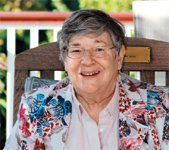Oct 01, 2011
By Jennifer Ringler
Pharmaceutical Executive
 Abbey S. Meyers
Abbey S. Meyers
Founder
National Organization of Rare Disorders (NORD)In 1982, the medication Abbey Meyers' son was taking to treat his Tourette's syndrome was only available as part of a clinical trial. The drug, from Johnson & Johnson, was initially intended to treat another, more common disease—so when the drug didn't show enough promise for its intended indication, Meyers' son was suddenly out of options. "One day my son's physician said, 'The company has stopped developing the drug. There are not enough people with Tourette's to make it a big enough market,'" she recalls. "And that struck me as really odd, because it was Johnson & Johnson, which had such a great reputation for being the company that takes care of babies."
Meyers refused to take no for an answer. She called other families with rare diseases, sent letters to major publications, and ruffled feathers. Others heard her story and shared similar experiences, where their children—because their disorders weren't common enough to bank on—were not getting the medication or treatment they needed.
J&J eventually got wind of the hoopla and called a meeting with Meyers. The drug company's position was: "We are responsible to our stockholders, and we can't develop a drug for such a small number of people." Looking back, Meyers says, "I thought to myself, I own stock. Not in J&J, but I'm a stockholder like everybody else. I don't want to invest in any company that is so callous that they would let children suffer."
After that meeting, J&J decided to keep producing the drug, Meyers says. But this concrete example of patient empowerment fostering change turned out to be only the beginning.
The issue snowballed, with more concerned parents and patients from around the country seeking Meyers out, sharing their own battles with Big Pharma and orphan diseases, and eventually banding together. After a segment on the Quincy show inspired by the story of a teenager with Tourette's, letters came pouring in, and those letters ended up in Meyers' lap.
"I said to myself, 'I'm fighting this because of one little kid, who happens to be my son, but this can't possibly be a problem just for my family,'" remembers Meyers. "So I called up the support groups for other rare diseases—Huntington's, scleroderma, and so on—and I asked, 'Are you having this problem too?' And most of them said yes. And I realized that, if somebody did find a cure for one of these diseases, it was never going to be manufactured."
Spurred by these conversations, Meyers formally founded the National Organization of Rare Disorders (NORD) in 1982. And in January of 1983, largely due to the efforts of NORD, the Orphan Drug Act was passed by Congress.
Throughout her 25 years in the industry, Meyers notes, "No matter where the discussion led, we found the table occupied by government and industry, and there was no voice for patients. So NORD became the voice of patients."
Though now retired, Meyers says that the key for NORD and other patient groups going forward will be to focus on—and to help fund—innovative research. "The fault of the industry is that they're still looking for the newest Viagra," she says. "I wish I had a penny for every dollar spent on trying to find me-too erectile dysfunction drugs. Nobody's ever died from erectile dysfunction!"
Instead, says Meyers, pharma and patient groups need to focus on research for less prevalent—but more impactful—medications, for serious and life-threatening diseases that have no current treatments available. "They have an opportunity here. They're not making lollipops. They're making life-saving drugs—and many of the people who I talk to in the industry went into this business because they wanted to be part of something that made a difference in humanity."

